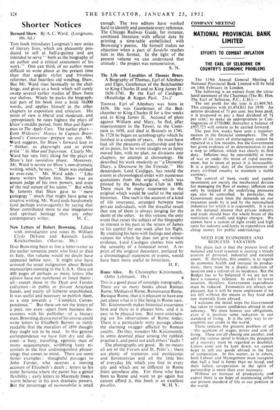Shorter Notices
Bernard Shaw. By A. C. Ward. (Longman. 10s. 6d.) Tins book introduces Longman's new series of literary lives, which are pleasantly pro- duced to sell at half-a-guinea and are intended to serve " both as the biography of an author and a critical assessment of his work." One can think of no author more difficult to write about at the present time than that angelic stylist and frivolous reformer, that heartless old windbag, Shaw. But Mr. Ward rises heroically to the chal- lenge, and gives us a book which will surely sweep several earlier studies of Shaw from our shelves. Wisely he packs the biograph- ical part of his book into a brisk 10,000 words, and applies himself in the other chapters to exposition and criticism. His point of view is liberal and moderate, and appropriately he rates highest the plays of la haw's middle period, from Man and Super- man to The Apple Cart. The earlier plays— from Widowers' Houses to Captain Brass- bound's Conversion—prepare no one, Mr. Ward suggests, for Shaw's forward leap as " thinker, as playwright and as prose Mist " in Man and Superman. Clearly Mr. Ward has very little liking for the plays of Shaw's last surrealiste phase. Moreover, . Mr. Ward is severe on Shaw's non-dramatic writing, which, he says, " Shaw was inclined to over-rate." Mr. Ward adds : " Like- many writers before him, Shaw was an unsure judge of his own powers, and even of the real nature of his talent." But while he laments that Shaw gave to " mere pedagogy " much that might have gone to creative writing, Mr. Ward ends handsomely (and perhaps extravagantly) by saying that Shaw contributed more to our imaginative and spiritual heritage than any other
contemporary writer. M. C.


































 Previous page
Previous page